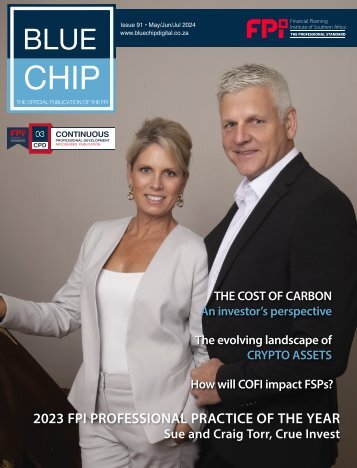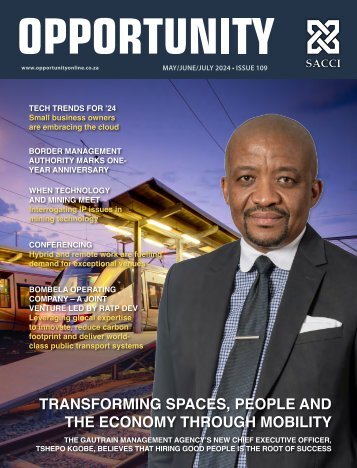South African Business 2016 edition
- Text
- Investment
- Government
- Business
- Development
- Network
- Sectors
- Investing
- Business
- Africa
- African
- Economic
- Manufacturing
- Mining
- Opportunities
- Economy
- Overview
FOCUS business people
FOCUS business people and tourists can land at OR Tambo International Airport and come straight into the Inner City. This is an opportunity which we can maximise upon and one that we cannot afford to miss,” elaborates Ramoreboli. The City of Johannesburg has been able to use the UDZ as a catalyst for development, stresses Naidoo. “Over the years, we have seen that it is possible to create wall-to-wall thematic precincts by attracting the right kind of investors. In the same vein, we realised that it was foolhardy to develop one building and skip the next, because, in essence, what we would be doing would simply bring down the value of the ones that have been developed. Hence if we are to develop the inner city, then let it be on a wide scale.” “In order for the UDZ to be effective, there needs to be a connection that will make economic sense for the City, while transforming the Inner City at the same time. On that note, Africa’s tallest and the biggest retail complex and commercial node, the Carlton Centre, will soon be undergoing a facelift and reconfi guration which will see the creation of Film District and the resuscitation of the Carlton Hotel,” reveals Ramoreboli. “In this way, it is hoped that the City will become even more dynamic and attractive and add to its new crop of already diversifi ed investors streaming into the Inner City.” Ramoreboli points out that this will augur well for the City’s tourism initiatives as well as its efforts to attract the BRICS Bank into the Inner City – which is already a fi nancial hub in its own right. When measured against other recipients of the UDZ tax incentive, the City of Johannesburg has been able to attract more investment than the rest combined, and this is all thanks to aggressive marketing efforts and the city Council’s’ commitment to improving the investment climate, she continues. “This incentive enables property owners to increase the value of their properties and improve their earning capacity within the UDZ. Corporate or small investors who own buildings that have degenerated can now restore and renovate them, and recover the money spent. No matter what other sources you may get your income from, one can deduct from their taxable amounts any money spent on building or refurbishing within the UDZ,” adds Naidoo. “It should be government’s role to facilitate equitable solutions with regards to sharing space within the City because there will always be a contestation between the rich and the poor and as government we need to mediate and fi nd solutions,” concludes the MMC, Ruby Mathang. internatio investors to join th of the Ci Inner Cit UDZ tax UDZ is av investors refurbish located i It comes on invest renovatio For clarit Lebo Ra Deputy D Phone: + Email: leb www.j Restore, Renovate and Recover Joburg’s UDZ Boundaries There are signifi cant fi nancial benefi ts that accrue to investors as part of the city’s UDZ tax incentive scheme. “It does not matter how big or small your property is, because you are eligible for major tax deductions if it is within the UDZ boundaries. In order to qualify, the investor has to restore, refurbish or add onto income generating property within the UDZ, or demolish old buildings and build new structures in their place, or purchase new or refurbished buildings or units,” explains Naidoo. An investor will qualify for a 100% tax deduction spread several years, depending on whether the investor has refurbished an existing structure or constructed a new building, but it is not the only benefi t. The Joburg UDZ is about 1 800 hectares and includes the core of the inner city (from Fordsburg to Jeppestown) and from Belleview to the M2 in the south. It also extebndes to Newtown, Hillbrow, Braamfontein, Yeoville, Troyville, Doornfontein, Ellis Park, Bertrams, Ferreirasdorp, Selby, Wolhuter, Vrededorp, Marshalltown, City and Suburban, Fairview and Benrose. SOUTH AFRICAN BUSINESS 2016 168
Join the 2nd Gold Rush!! The City of Joburg equates the UDZ’s investment resurgence to the 2nd Gold Rush into the “Heart of the City of Gold”. The City therefore invites domestic and international investors; traditional property investors, new entrants, women and the youth to join the “2nd Gold Rush” into the “Heart of the City of Gold” and contribute to Joburg’s Inner City revitalization and benefit from the UDZ tax incentive. UDZ is available to income tax paying property investors who invest in construction or refurbishment of income-earning buildings located in the Inner City of Joburg. It comes in the form of accelerated depreciation on investment made towards construction or renovation of Inner City building. For clarity and technical information, contact: Lebo Ramoreboli Deputy Director: UDZ tax incentive Phone: +27 11 358 3437 Email: lebor@joburg.org.za www.joburg.org.za/udz
- Page 1:
SOUTH AFRICAN BUSINESS 2016 EDITION
- Page 6:
CONTENTS Introduction CONTENTS Sout
- Page 10 and 11:
CREDITS Publisher Chris Whales Publ
- Page 12 and 13:
SPECIAL FEATURE South Africa A peri
- Page 14 and 15:
SPECIAL FEATURE In a year that saw
- Page 16 and 17:
SPECIAL FEATURE owes its existence
- Page 18 and 19:
SPECIAL FEATURE against water losse
- Page 20 and 21:
SPECIAL FEATURE Operation Phakisa h
- Page 22 and 23:
SPECIAL FEATURE late in 2014. The h
- Page 24 and 25:
SPECIAL FEATURE Understanding Afric
- Page 26 and 27:
INTERVIEW Job creation on track Ala
- Page 28 and 29:
SPECIAL FEATURE Business funding Th
- Page 30 and 31:
SPECIAL FEATURE in turn makes it ve
- Page 32 and 33:
SPECIAL FEATURE Contact: 012 394 18
- Page 34 and 35:
SPECIAL FEATURE Black Business Supp
- Page 36 and 37:
SPECIAL FEATURE The evolution of sk
- Page 38:
SPECIAL FEATURE providing TVET lear
- Page 42:
PROFILE FP&M Seta Facilitating and
- Page 45 and 46:
• The development of a national s
- Page 48 and 49:
FOCUS Champions of change Five dyna
- Page 50 and 51:
SPECIAL FEATURE The top law firms S
- Page 52 and 53:
SPECIAL FEATURE Keeping the BRICS t
- Page 54 and 55:
SPECIAL FEATURE Keeping BEPS in che
- Page 56 and 57:
SPECIAL FEATURE IPAP in action In 2
- Page 58 and 59:
FOCUS THERE’S NO END TO THE BENEF
- Page 60 and 61:
INTERVIEW The riches of Africa awai
- Page 62 and 63:
INTERVIEW and it could actually be
- Page 64 and 65:
PROFILE ECIC exco profiles Profiles
- Page 66 and 67:
INTERVIEW The hub of Africa Tim Har
- Page 69 and 70:
Key sectors Overview of the main ec
- Page 71 and 72:
OVERVIEW from the subsistence farme
- Page 73 and 74:
OVERVIEW South Africa produces abou
- Page 75 and 76:
South Africa’s looming energy gap
- Page 77 and 78:
How will these resources be develop
- Page 79 and 80:
Vall exclusive economic zone limits
- Page 82 and 83:
OVERVIEW NEED PIC Mining The South
- Page 84 and 85:
OVERVIEW Mineral beneficiation The
- Page 86 and 87:
PROFILE The Council for Geoscience
- Page 88 and 89:
OVERVIEW Energy The South African e
- Page 90 and 91:
INTERVIEW Cummins South Africa Cumm
- Page 92 and 93:
OVERVIEW Manufacturing Increasing m
- Page 94 and 95:
OVERVIEW Automotive International i
- Page 96 and 97:
OVERVIEW Automotive components Incu
- Page 98 and 99:
OVERVIEW Chemicals and pharmaceutic
- Page 100 and 101:
OVERVIEW Healthcare South Africa’
- Page 102 and 103:
OVERVIEW Water Severe water restric
- Page 104:
OVERVIEW Improving quality The intr
- Page 107 and 108:
Our Vision is is “Quality water f
- Page 109 and 110:
OVERVIEW 107 SOUTH AFRICAN BUSINESS
- Page 111 and 112:
OVERVIEW airports in India and Braz
- Page 113 and 114:
affords, while maintaining its envi
- Page 115 and 116:
kets, except Australia. In Africa,
- Page 117 and 118:
Rosebank, Johannesburg, renamed ‘
- Page 119 and 120: Trade with Africa Improved infrastr
- Page 121 and 122: FOCUS MTN plugs R1.2-billion into K
- Page 123 and 124: MTN rolls out fibre infrastructure
- Page 125 and 126: OVERVIEW community engagement. The
- Page 127 and 128: PROFILE For BEE Verification and is
- Page 129 and 130: OVERVIEW attracting and retaining c
- Page 131 and 132: OVERVIEW Small business is taken ve
- Page 133 and 134: Franchise Fund—an innovative plat
- Page 135 and 136: educating young people in fields th
- Page 137 and 138: OVERVIEW Management Plan has divert
- Page 139 and 140: hazardous waste is also not being c
- Page 141 and 142: INTERVIEW yourself up as a Tier 1 o
- Page 144 and 145: OVERVIEW Renewable energy South Afr
- Page 146 and 147: INTERVIEW Plenty of scope for solar
- Page 148 and 149: LISTINGS South African business org
- Page 150 and 151: LISTINGS South African National Gov
- Page 152 and 153: LISTINGS Department of Communicatio
- Page 154 and 155: LISTINGS Department of Human Settle
- Page 156 and 157: LISTINGS Department of Science and
- Page 158 and 159: OVERVIEW Regional overview: Eastern
- Page 162 and 163: INTERVIEW Buffalo City on the rise
- Page 164 and 165: OVERVIEW Regional overview: Free St
- Page 166 and 167: OVERVIEW Regional overview: Gauteng
- Page 168 and 169: FOCUS A Catalyst for Economic Devel
- Page 172 and 173: OVERVIEW Regional overview: KwaZulu
- Page 174 and 175: OVERVIEW Regional overview: Limpopo
- Page 176 and 177: OVERVIEW Regional overview: Mpumala
- Page 178 and 179: The powerhouse of Africa Mpumalanga
- Page 180 and 181: Mpumalanga: Key Sectors Mpumalanga
- Page 182 and 183: Nkomazi Special Economic Zone The N
- Page 184 and 185: INVEST IN THE PROVINCE OF THE RISIN
- Page 186 and 187: OVERVIEW Regional overview: Norther
- Page 188 and 189: OVERVIEW Regional overview: North W
- Page 190 and 191: OVERVIEW Regional overview: Western
- Page 192 and 193: FOCUS Khayelitsha - the power of to
- Page 194 and 195: INDEX INDEX Abeco Tanks ...........
- Page 196: ENSafrica.com ENSafrica | Africa’
Inappropriate
Loading...
Mail this publication
Loading...
Embed
Loading...






















































































































































